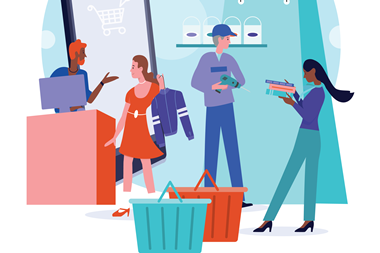The pandemic has changed the course of retail forever. Here are the three key learnings retailers can take from it, says Belinda Deery, chief engagement officer at Kultralab.
During the global pandemic, the underlying capability of the retail workforce has been starkly revealed as the sector dealt with both the underlying structural fault lines in the shift from bricks to clicks as well as the catastrophic impacts of Covid-19.
In 2021 and beyond, retail will continue to change at a bewildering pace. Kultralab has been leading conversations with senior retail leaders across the industry globally to understand and act on the strategic responses that need to be made.
We are sharing our initial findings in our report The DNA of the Future Consumer Workforce, created in partnership with World Retail Congress. Here are three things about the retail workforce the pandemic has helped us to understand:
1. A diverse workforce is a better one
Curiously, one inadvertent benefit of Covid-19’s impact on retail has been to create the conditions for faster workforce composition shifts on a scale that simply would not be possible in normal times.
During interviews with retail leaders over the past few months, we have listened to their reflections on how their workforce has evolved over the past year.
Those who have been in the fortunate position of needing to hire additional staff in great numbers to cope with an exponential surge in demand for products and services spoke of hiring talent that would not necessarily have fit their typical profile but were readily available, having been displaced from other sectors harder hit, such as aviation, transport and the arts.
Without exception, their stories were positive, all describing how the resulting workforce mix had materially shifted their organisation for the better – bringing fresh motivation and energy, new skills, curiosity and constructive challenge, as well as wholly different perspectives on business challenges and opportunities.
What is really encouraging is that those leaders now intend to use this new insight to double down on their inclusion and diversity agendas, having had tangible experience of the benefits diversity brings.
2. Digital fluency is needed by everyone working in retail
Technology and data have been influencing how retailers do business for decades, but 2020 was the year that for many forced – at blistering pace – a complete technological reimagination of their entire way of doing business.
“In the future, everyone will need to develop full confidence and fluency with technology and data to drive better outcomes, whatever their role”
Almost every person has had to step up their digital literacy to continue to operate effectively either at work, school or home. However, being digitally literate and being digitally fluent are different – digital fluency is a more holistic capability than digital literacy.
It involves the ability to move nimbly and confidently from one technology to another, compare, contrast and analyse differences in technologies, understand how those differences might impact work or study, and know when and why to use particular tools, with the ability to seamlessly combine tools to achieve better outcomes.
In the future, digital fluency cannot only be a capability limited to parts of the retail workforce. Everyone will need to develop full confidence and fluency with technology and data to drive better outcomes, whatever their role.
3. Obsessing about your customers makes you more resilient
We know that the companies that have a deep understanding of what their customers want and expect – and work hard to deliver a personalised service that exceeds expectations – create long-term customer loyalty.
Small independents and the quick-to-respond largest retail businesses have shown us the way to achieve this competitive advantage and sustain it through the crisis, delivering exceptional service in creative ways.
Employees who go the extra mile to continue to serve shielding or locked-down customers, offering virtual shopping and consultations and rapid home-delivery timelines, have been absolutely necessary to stay in the game.
Continuing to retain customer loyalty within the context of this new normal requires continual reimagination of the customer experience.
Retailers need to embrace this new paradigm and encourage, empower and equip their teams to build strong and long-standing relationships with customers based on exceptional service.
Belinda Deery is chief engagement officer at Kultralab

Belinda Deery is responsible for all the services we deliver to our clients and a board-level CHRO with global consumer experience, having delivered capability and culture-change programmes in large multinational organisations. Deery was previously chief people officer at Clarks and HR director at New Look.


























